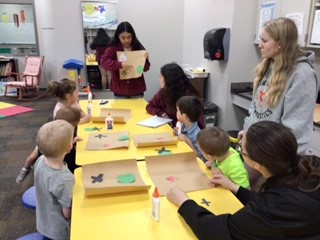
Farmington High School offers learners many practical and hands-on learning experiences, especially in the Family and Consumer Sciences department. A state approved program of study in human services is among the variety of classes offered at Farmington High School to nourish learners’ sparks and prepare them for future careers. The program of study includes a series of three child development classes which culminates in a practicum, called the Learning Lab, where high school students design and teach preschool lessons to actual preschoolers. To participate in the Learning Lab, students must first take the Developing Babies and Toddlers to Teens classes. Each class is a trimester long, so this program can be completed in one school year.
Children from around the community are invited to participate for any or all of the Learning Lab sessions. Each session is different but includes typical preschool experiences such as art projects, science experiments, puppet shows, and snack time. FHS students plan and lead the sessions with the help of their teacher, Kathryn Peterson.
“My role as their teacher is to create the appropriate setting, model methods and procedures, and communicate with parents,” said Peterson. She sets the daily schedule for the Learning Lab and lets the students plan the rest: leaders, activities, songs and transitions. During the Learning Lab the high school students work in groups to create lesson plans, lead activities, evaluate their work, and observe the actions of the children and other students.
and procedures, and communicate with parents,” said Peterson. She sets the daily schedule for the Learning Lab and lets the students plan the rest: leaders, activities, songs and transitions. During the Learning Lab the high school students work in groups to create lesson plans, lead activities, evaluate their work, and observe the actions of the children and other students.
High school learners work in two groups: one with the children and one observing through a two-way mirror. The members of each group take turns leading and assisting when they are with the children. The observers practice writing objective observation records. A standard baby monitor pipes sound from the preschool room to the classroom where the observing group sits.
In the lab the students are expected to have a purpose, steps to achieve that purpose, and tie-ins to a predetermined theme. “We practice ways to speak to children, how to handle movement, appropriate reinforcement, and transitions,” said Peterson. The class takes time to reflect on the experience in writing both in the middle and at the end of the lab period.
All of this work is in preparation for the Technical Skills Assessment, a  national assessment that is written by the American Association of Family and Consumer Sciences, which serves as the final exam for the class. Any student who scores 70% or higher on the assessment earns a Pre-Professional Certification in Early Childhood Education that is valid for 3 years. This is a valuable program for all learners who have an interest in working with children in a childcare setting, education, counseling, healthcare, or a of other places and industries.
national assessment that is written by the American Association of Family and Consumer Sciences, which serves as the final exam for the class. Any student who scores 70% or higher on the assessment earns a Pre-Professional Certification in Early Childhood Education that is valid for 3 years. This is a valuable program for all learners who have an interest in working with children in a childcare setting, education, counseling, healthcare, or a of other places and industries.